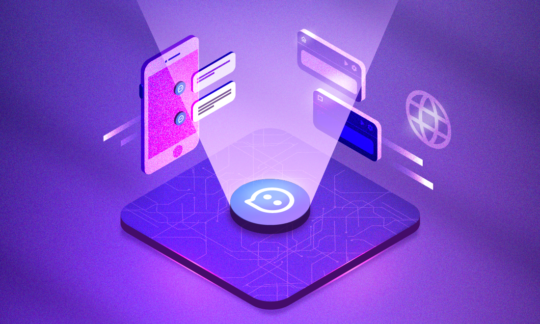WhatsApp chatbots and why they matter
Table of contents
- The new standard in customer service
- So, why should you care about WhatsApp AI chatbots?
- Real-life applications of WhatsApp conversational AI
Market research makes it clear: WhatsApp rules supreme. The top messaging app in 60 countries (31% of the world) currently has more than 2 billion monthly active users. It equals the entire population of Europe and the USA multiplied twice.
Few expected such growth in 2014 when WhatsApp’s main competitor, Facebook (now Meta), acquired the company. The purchase turned out the right way for the tech giant. The app’s user base quickly left Facebook Messenger far behind in the second place (with ‘only’ 988 million users, constituting ‘only’ 7% of the world).
WhatsApp is currently available in 180 countries and 60 languages. It is relatively popular among all age groups and shows exceptional market penetration in developing countries. Every day people send over 100 billion messages using the app.
All these factors lead to an obvious conclusion. In the age when customer service automates and shifts into the virtual world, you cannot overestimate the commercial potential of such a platform. Coming from our expertise in conversational AI and its applications, we sincerely believe that WhatsApp chatbots for businesses will soon become…
The new standard in customer service
During the last decade, messaging became a popular means of customer-brand communication. It is evident to any customer service manager that brands should meet their customers on their preferred platforms, especially when these platforms provide relevant business-oriented solutions.
At some point, Meta learned that an increasing number of local business owners use their private WhatsApp accounts to contact customers. So the company decided to provide platforms dedicated to entrepreneurs. WhatsApp for Business, concurrently with WhatsApp for Business API, launched in 2018, meeting with great reception. Today, more than 5 million companies worldwide use these platforms. In 2021, they generated over $8 billion in revenue.
WhatsApp for Business API is especially promising. It allows for integrating the company’s WhatsApp profile with external platforms, like CRM (Customer Relationship Management) software or… AI chatbots.
In short, here’s the situation:
The largest messaging app in the world provides support for one of the most promising technologies in customer service. We’d say: that’s something your company should take advantage of, shouldn’t it?
So, why should you care about WhatsApp AI chatbots?
In recent years, progress made in Machine Learning transformed AI from a nerdy sci-fi concept to a functional and accessible tool. One of the most exciting developments we’ve seen was the advancement of Natural Language Understanding (NLU) technology.
Conversational algorithms have learned a lot about how humans use language. When it comes to comprehending our intents, contexts we use, moods and needs, they get better by each day.
For that reason, NLU algorithms are revolutionising customer service, automating tasks that seemed impossible. They answer questions, make recommendations, and gather leads. Insider Intelligence predicts global consumer retail spending via chatbots will reach $142 billion by 2024 – increasing by ‘merely’ over 5000% from $2.8 billion back in 2019.
If you’d like to learn more about chatbots’ potential, we recommend reading our chatbots guide. If you’re good, let’s look at some of the benefits WhatsApp chatbots can offer your clients (and, by proxy, your company, and its revenue).
24/7 availability
We don’t want to put you under stress, but a recent study by Zendesk found that 76% of customers expect an immediate answer when contacting a company. That indicates that the shorter the wait, the higher the client satisfaction. It matters a lot, especially since 61% of customers are willing to walk away after a single bad customer service experience.
In a connected world, customers no longer feel that you can limit your availability to office hours. 57% of customers expect brands to become available 24/7 within the next few years. People want to use your services whenever it is convenient for them — for instance, late at night, right before bed, once they have fulfilled their responsibilities, and eventually get a moment to spare.
Before AI solutions became available, meeting such expectations would demand an increased workforce and significant investments. It would significantly challenge the big companies and prove impossible for medium and smaller ones.
AI chatbots never sleep. They never get sick or go on a break. They’re available 24/7 and can handle enormous messaging volumes without breaking a sweat.
That brings us back to…
Customer satisfaction
73% of business leaders claim customer service directly affects business performance. It’s safe to say that customer satisfaction impacts your bottom line. As we’ve already established, WhatsApp chatbots’ availability and quick response time will help you keep your clients happy. But there are more ways in which conversational AI can improve your CR:
- Guiding customers through sales funnels. You can train WhatsApp chatbots to answer most questions about your products or services. They can make suggestions, offer discounts, and provide detailed information on payment and shipping methods available.
- Offering personalised service. AI can act almost humanlike and go way beyond the stiff, robotic interactions we associate with older virtual assistants. You determine your bot’s personality according to your brand’s values. It may adopt a formal or informal manner, be friendly and chatty, or be down to earth – whichever suits you.
While it might feel like a purely cosmetic change – it matters. In a survey conducted by the McKinsey consulting agency, 76% of respondents claimed they were more likely to purchase when offered a personalised service. Customers want to feel welcome, important, and special even when they’re well aware they’re chatting with an AI.
This personalisation goes beyond mere courtesy. Conversational AI learns from previous interactions and, provided with sufficient data, will recognise different kinds of customers. In time, it’ll start predicting their expectations and make recommendations based on previous successful sales.
Empowering your sales team
Chatbots save your workers from performing many mundane tasks. They handle all the fundamental interactions and redirect clients to a human only when necessary. It allows for cutting costs and focusing your employee’s efforts where they matter.
If properly deployed, chatbots can provide insights from their interactions. They can analyse large quantities of data, so it should be easy to determine what works and doesn’t. It is invaluable knowledge about which offers likely convert to sales, what concerns people about a given product, or why they give up on a purchase.
Security
WhatsApp uses end-to-end encryption protocols. It means that only the sender and the receiver can access the message’s contents. No one, not even WhatsApp employees, can crack that encryption. In times when businesses must be cautious about protecting their customers’ data, it is a significant advantage.
However, both WhatsApp and WhatsApp for Business clients allow Meta to store messages’ metadata and create other risks in terms of legal data protection. Only WhatsApp for Business API and a proper deployment on the company’s end will ensure data security and compliance with GDPR (or similar laws).
Market penetration
Finally, it’s worth noting what we’ve mentioned earlier: WhatsApp is extremely popular. Worldwide. That includes many developing economies, where other social channels often don’t perform as well. While chatbots can work on many different platforms, you should offer your services in a familiar environment for your customers.
Real-life applications of WhatsApp conversational AI
MyGov Corona Helpdesk
When COVID-19 struck, the Indian government looked for ways to fight misinformation and educate people on coronavirus prevention. As other channels quickly became overloaded, the administration decided to hire Haptik and deploy an informational WhatsApp chatbot.
Created in under five days, MyGov Corona Helpdesk could offer advice on safety precautions, combat misconceptions about the virus’s transmission, and diagnose its users remotely. It provided information and warnings from the Ministry of Health. It supported both English and Hindi.
Chatbot interacted with over 84 million users and answered over 110 million queries.
Stars of Africa: Football Academy Trials Registration
Stars of Africa is one of the largest youth football academies in South Africa, dedicated to discovering, guiding, and supporting young talents. The organisation builds development centres in schools and communities and provides high-quality coaching to the often disadvantaged youth.
In recent years the academy faced problems handling the volume of applications for its annual open trials. These events, aimed at scouting new young talents, were managed by small teams and hardly prepared for such excess demand. The fact that the existing trial registration process was slow and inefficient didn’t help either.
Stars of Africa and Hash Ads launched a WhatsApp chatbot automation, offering players a guided registration experience. The chatbot would ask all the necessary questions, complete the registration, and later provide updates about trials’ dates and results. Additionally, it exported each successful registration to a Google spreadsheet.
The results? Record-high attendance and a 60% increase in trial revenue.
Unilever Brazil
The consumer goods giant aimed to create an effective launch campaign for its new line of washing products. Because of its popularity in Brazil, the company decided that WhatsApp would be the perfect platform for the campaign. Soon, a thousand posters were put up across São Paulo, displaying intriguing messages and a mysterious WhatsApp number.
People who messaged the number encountered MadameBot – an AI chatbot offering advice on clothing care and informing about new products. It broke the ice with relevant memes, provided product-related media, and proposed 50% discounts with free shipping.
Within the next seven days, the chatbot exchanged almost 300 thousand messages and generated 14 times higher sales than on ordinary days.
Give WhatsApp chatbots a chance
If we’ve piqued your interest (and since you’ve got this far, we most likely have), you might wonder whether a WhatsApp conversational AI would suit your business’s needs.
We suggest you reach out to us, so we can talk and possibly dispel any doubts you have.
Here at SentiOne, we aim to build bots that understand natural spoken language the way humans do. Thanks to access to large datasets from social listening and a dedicated R&D team of AI engineers and linguists, our SentiOne intent detection engine achieves an accuracy of 94%.
With SentiOne Automate you can integrate a world-class NLU with WhatsApp for business API. This way, you can build your own WhatsApp bots using our intuitive interface (drag and drop blocks, automated testing, visual flow) and, thanks to our NLU models, guarantee high customer satisfaction. Furthermore, our solutions are fully compliant with the GDPR.
Learn more about the SentiOne Automate, or talk to us if you want to try it out.



